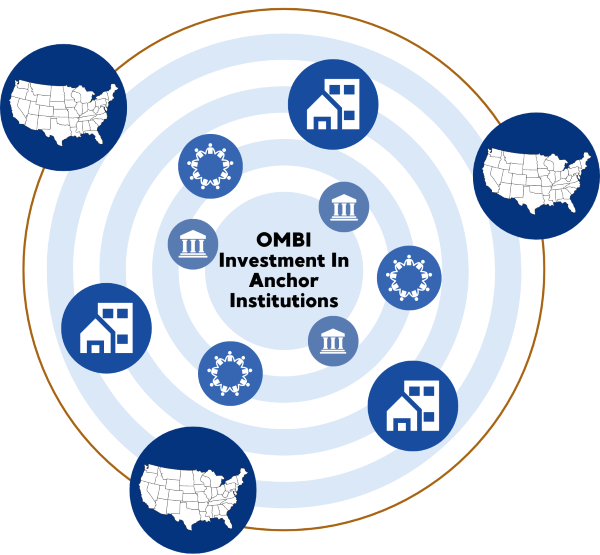Part I: Expanding Access to Broadband
Office of MinorityBroadband Initiatives
OMBI’s authorizing legislation explicitly calls for the Office to collaborate with anchor institutions and their stakeholders to achieve digital equity within the anchor community. The CAA 2021 defines an anchor community as “any area that…is not more than 15 miles from a historically Black college or university, a Tribal College or University, or a Minority-serving institution; and has an estimated median annual household income of not more than 250 percent of the poverty line” (Section 902 (a)(1)).
OMBI is increasing capacity in the anchor communities to develop place-based skilled workforce to drive local economies. Anchor institutions, specifically Institutions of Higher Education (IHEs), are force-multipliers for expanding broadband access, building partnerships, and leading communities toward economic growth and community vitality (U.S. Department of Housing and Urban Development, 2013). As a stone dropped in a pond produces ripples that reverberate across the water, strategic investments in these anchor institutions lead to wide-spread impact.
Anchor institutions, such as HBCUs, have the scale to drive local and regional economic benefits–generating $14.8 billion annually in economic impact and 134,090 jobs in their local communities (United Negro College Fund, Inc., 2017). These institutions play a significant role in supporting the educational attainment for individuals from historically marginalized communities. HBCUs represent about 3% of two-year and four-year public and private institutions that participate in federal student financial aid programs; they award 17% of all bachelor’s degrees earned by Black students (Williams & Davis, 2019). Similarly, HSIs represent 16% of all higher education institutions yet serve 65% of all Hispanic students (Hispanic Association of Colleges and Universities, 2023). The role of HSIs is particularly important as Hispanics are much more likely to be first generation college students than other racial or ethnic groups and are also significantly underrepresented in four-year bachelor’s degree programs (Postsecondary National Policy Institute, 2022). In many Tribal communities, TCUs are an essential source of Internet to Americans on rural Tribal lands because 31 of 35 accredited TCUs serve as community libraries (Whissemore, 2020).
Through OMBI’s investments of resources and technical assistance to these anchor institutions, students, faculty, and community members receive the technology and training they need to increase skills in digital literacy, STEM, cybersecurity, coding, and other business skills.
Digital skills are necessary to access economic and workforce opportunities that reverberate across the community. A recent study by the National Skills Coalition and the Federal Reserve Bank of Atlanta found that 92% of job postings require digital skills – including entry level and frontline jobs. The jobs requiring digital skills also paid significantly more.

“Workers that qualify for jobs that require even one digital skill can earn an average of 23 percent more than in a job requiring no digital skills. Moving from a job requiring no digital skills to one requiring at least three can increase pay by an average of 45%” (Bergson-Shilcock & Taylor, 2023).
In addition, access to broadband Internet expands job search capabilities, keeping the unemployed active in the labor market (Beard et al., 2012). Community-wide broadband Internet services also improve access to telehealth services which can increase work time and productivity.
Taken together, these investments in anchor institutions produce ripple effects that drive economic development within anchor communities, across counties, states, and bring more talent to the future of work throughout the United States.

OMBI invests resources and technical assistance to increase institutional capacity and provide equipment to increase broadband Internet access.

Anchor communities are able to access education and training that will lead to a more highly-skilled workforce.

Increased broadband access advances a place-based skilled workforce to respond to economic opportunities.

States see increased economic competitiveness and public services are delivered more efficiently.
With collaboration at its core, the Office’s innovative approac h to federal grantmaking and OMBI FY2023 ANNUAL REPORT Page 13 of 55 program delivery takes into account local needs, context, and relationships. OMBI brings this approach to its three operational pillars:
Collaborate with Federal, State, Tribal, and Anchor Institution Stakeholders
OMBI works to increase collaboration, knowledge sharing, and thought leadership to improve Internet access and adoption among minority communities.
Build Capacity of Anchor Institutions and their Communities
Through technical assistance and other support, OMBI empowers applicants, grantees, and collaborating entities with the appropriate tools and resources to effectively implement the CMC Pilot Program or other grants in minority communities.
Administer the Connecting Minority Communities Pilot Program
The Connecting Minority Communities Pilot Program provides funding for Internet access, technology, and personnel in an effort to close the digital divide at HBCU, TCU, and MSI anchor institutions and within their communities.
